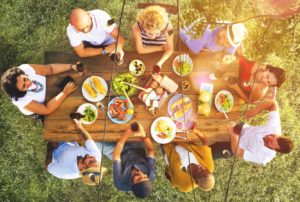 In 1896, a column from New Oxford newspaper wrote, “the latest ‘fad’ is to issue invitations for a meal called ‘brunch’… a repast at 11 o’clock a.m.”
In 1896, a column from New Oxford newspaper wrote, “the latest ‘fad’ is to issue invitations for a meal called ‘brunch’… a repast at 11 o’clock a.m.”
Fast forward to 2017 and this “fad” hasn’t died out like fads usually do. Originally intended for the affluent as a drawn-out elaborate affair, brunch soon crept into mainstream America. Breakfast and lunch, coming together to create a convenient, delicious meal, seemed to jive well with a lot of Americans.
Over 120 years later, brunch hasn’t swept over the entire country just yet. As with all things, some like it more than others. Let’s explore why brunch is still here and who’s making it stay.
Who Eats Brunch?
A Google Trends data reveal people search for “brunch” more in the spring, incidentally during Easter and Mother’s Day. Apparently, nothing says “thanks, Mom” like a platter of pancakes, French toast and Waffles.
More Google data says brunch popularity is high in Washington, D.C., New York, Maryland, and Massachusetts. Researchers suggest that interest is higher in people with disposable income and time.
 Why is Brunch so Popular?
Why is Brunch so Popular?
The so-called brunch movement is here because of the changes in how Americans eat breakfast.
Breakfast is no longer the family affair it was once was. Simply, fewer adults eat breakfast today, the number dropping from 89% to 82% in just 20 years. Millennials have proven the likeliest to skip the morning meal.
This decline has opened the door for many breakfast foods to be eaten on the weekends, when days aren’t quite as hectic and cravings have built up over the week. That explains why most people wait for the weekend to eat their favorite breakfast platter, and usually when it’s almost time for lunch. Breakfast restaurants, like The Toasted Yolk, serve breakfast and lunch foods all day, helping quench some of these cravings.
More than a Meal
When it comes to breakfast and lunch meals, you don’t just pay for the food and the venue. It’s the experience. In 1895, A British writer named Guy Beringer wrote an article titled, “Brunch: A Plea” in Hunter’s Weekly. He said, by not having to get up early for breakfast on a Sunday, people became happier. He described brunch as “cheerful, sociable, and inciting”, as well as “talk-compelling.” It gave people better temper and self-satisfaction. “Brunch sweeps away the worries and cobwebs of the week.”
While this notion may sound overreaching, brunch is, in fact, more significant than many think. What do you think popularized daytime drinking in America? Hint: Not the Irish.
But, on a more significant note, brunch has changed the way Americans eat breakfast, invite company, and spend their Sunday mornings.
If the ‘fad’ didn’t dribble out like a runny egg years ago, it’s safe to say it’ll be here to stay in the few years to come. Toast to that.

